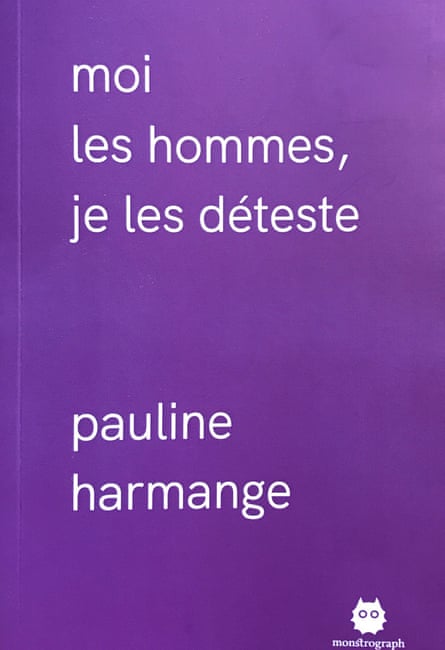When Pauline Harmange, a French writer and aspiring novelist, published a treatise on hating men, she expected it to sell at the most a couple of hundred copies among friends and readers of her blog.
Instead, a threat by a government official to take legal action to ban Moi les hommes, je les déteste (I Hate Men) has made it a sellout. The first 450-copy print run was quickly snapped up, as was the following two reprints. Now 2,500 copies have been sold.
The publisher, Monstrograph, described as a “micropublishing house” run by volunteers, is overwhelmed and says I Hate Men will not be reprinted again unless a bigger publisher comes to the rescue.
Harmange, 25, is a mix of bemused and shell-shocked to find herself in the middle of a literary and political storm. “I didn’t expect this. It’s been an enormous surprise,” she told the Guardian from her home in Lille, northern France, where she lives with her husband, Mathieu, 29, and Eleven the cat. “It’s the first time I’ve had a book come out. I wrote a novel but it was never published.”
Harmange said she was asked to write I Hate Men after someone spotted a blog she had written on misandry, or man-hating.

The 96-page essay opens with a quote from Sylvia Plath’s The Bell Jar – “The trouble was, I hated the idea of serving men in any way” – and it explores whether women have good reason to hate men. “I am married to a man, who is great and really supports my writing. But in general I mistrust men I don’t know,” Harmange said.
“I just don’t have confidence in them. This comes less from personal experience than from being an activist in a feminist organisation that helps the victims of rape and sexual assault for several years. I can state for a fact that the majority of aggressors are men.”
She added: “If we are heterosexual we are encouraged to like men, but we should absolutely have the right not to like them. I realise this sounds like a violent sentiment, but I feel strongly we should be allowed to not love them as a whole and make exceptions for certain men.”
The book says defending misandry is liberating and can create space for sorority and sisterhood. “What if women have good reasons to detest men? What if anger towards men is in fact a joyful and emancipating path when it is allowed to express itself?” Harmange writes.
I Hate Men was published on 19 August when much of France was enjoying the summer holiday, and it almost certainly would have passed unnoticed had Ralph Zurmély, an adviser to France’s gender equality ministry, not written to threaten legal action.
“This book is obviously an ode to misandry (= hatred of men), both in terms of the summary on your site and in reading its title. I would like to remind you that incitement to hatred on the basis of sex is a criminal offence! Consequently, I ask you to immediately remove this book from your catalogue under penalty of criminal prosecution,” Zurmély wrote.
Harmange said: “We were a little afraid to start with. But the first print had already been sold so the publishers decided to send the books out and see what happened. As a precaution they didn’t print any more.
“I was shocked. This man works for the secretary of state for equality between men and women, whose mission is to do something about sexual assaults and rapes. It seemed outrageous that he was more concerned about censoring a small feminist book instead of doing his job.”
When the story was picked up by the French investigative website Mediapart, the publishers went ahead with a reprint. The ministry told Mediapart that Zurmély, who it appeared had read only the title and the publishers’ description of I Hate Men, had acted on his own initiative.
The French magazine NouvelObs described Zurmély’s zeal as “cancel culture” par excellence and pointed out that nobody had sought to censor Baudelaire from writing of the 19th-century French novelist George Sand: “She is stupid, she is heavy, she is talkative […] The fact that a few men have fallen in love with this latrine is proof of the lowliness of the men of this century.”
“And why not ban Michel Houellebecq for his misogyny while we’re at it,” asked NouvelObs.
Harmange laughed at the idea. “Unfortunately, but not surprisingly, misogyny is so well anchored in French literature we often don’t even realise it.”
She said misandry was often seen as a joke or, worse, a tool to discredit feminists, but she believes there is nothing wrong with owning this hatred, which she says is legitimate given the harm men do to women.
“Misandry exists only as a reaction to misogyny, which is at the root of systemic violence,” she writes. The book cites statistics from 2018 showing that 96% of people convicted of domestic violence were men and 99% of those convicted of sexual violence were men. “Whereas misandry has never killed anyone,” Harmange writes.
Harmange says her husband is one of the “exceptions”. In the thanks at the end of the book, she writes that he was “the first of us to believe in me”.
She said: “He’s as astonished as I am about the reaction to the book, but he supports me and my writing. He just worries about me getting harassed online.”
Harmange said the negative reaction to the book was predictable. “Female and feminist voices aren’t always welcome among men.”
